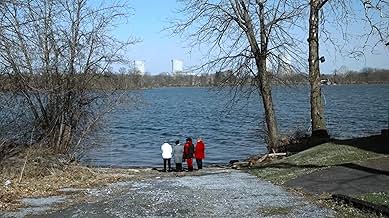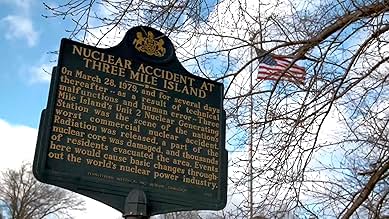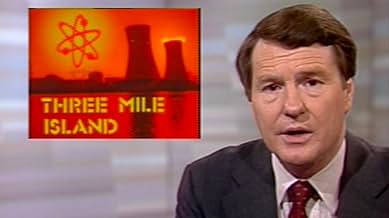अपनी भाषा में प्लॉट जोड़ेंA feminist feature documentary about the 1979 Three Mile Island meltdown with never-before-told stories.A feminist feature documentary about the 1979 Three Mile Island meltdown with never-before-told stories.A feminist feature documentary about the 1979 Three Mile Island meltdown with never-before-told stories.
Joanne Doroshow
- Self - Represented Three Mile Island Alert Community Group
- (as Joanne Doroshow - Attorney)
Lynne Bernabei
- Self - Represented Three Mile Island Alert Community Group
- (as Lynne Bernabei - Attorney)
Jack Herbein
- Self - Vice President, Metropolitan Edison
- (आर्काइव फ़ूटेज)
- (as John Herbein)
फ़ीचर्ड समीक्षाएं
This enlightening documentary exposes the political, emotional and physical effects on those living in the vicinity of the 1979 Three Mile Island Nuclear Disaster. The caring, concern of producer, Professor Heidi Hutner, explains how these four empowered mothers grappled with mis and the lack of information and so become politicized in order protect and preserve the welfare of their families. The facts and legal entanglements of these issues are sincerely recounted by the reporter and lawyers who attempted to uncover the truth. The women in this film speak loud and clear and still the physical effects remain obscured by the nuclear industry. These women's legacy to us, as women, and in fact as humans, is our own mission for today to seek truth about nuclear power, before we too have to deal with the fallout.
This film fills a critical void in the coverage of Three Mile Island. While it is tempting to let TMI fade into the past, the impact it had on nearby residents continues to this day. Hutner has done a masterful job of telling the stories of these women and integrating it with the science that suggests that harms to health might have been greater than understood at the time. That combination, the stories of the victims together with cutting edge science is not so easy to get right and she has done it masterfully. While current research continues and the full answers are not yet known, it is appropriate to take stock and consider the risks of nulcear power even as some are promoting it as an alternative to fossil fuel combustion.
I watched this at an environmental film fest. Knowing very little about Three Mile Island, I was disturbed to learn the extent of the failings of the local and federal government and big business. The residents of the community and our entire nation were misled. Telling this story through the eyes and of mothers in the community was effective and sincere. The women brought tears to my eyes but also laughs. You see their stories play out over decades and they are truly heroes and dedicated advocates. There are fascinating science and health concerns raised (I won't spoil them here), but you will walk away from the film with a healthy skepticism of nuclear energy and the protections in place in the United States of America.
Fascinating documentary on the women--local mothers, a waitress, a young lawyer--who fought efforts to downplay the accident by the nuclear industry and the federal Nuclear Regulatory Commission.
Their efforts led to hearings that cast doubt on officials' statements--for example, it turns out no one knows how much radiation was released because the sensors atop the towers were pushed past their maximum limits--and led to the federal prosecution and conviction of the utility company for falsifying records.
The film notes that more such doubt is cast by recent peer-reviewed, journal-published research. One paper shows that cancer rates are higher where the radioactive plume fell. Another paper explains the disparity between official expectations of illness and the observed higher rate--in part because the expectations accounted for short-lasting gamma radiation and not fat-soluble beta radiation.
The film notes that the efforts of these women did not stop the reopening of TMI after six years--but did help scuttle more than 100 planned nuclear plants.
Well worth seeing.
Their efforts led to hearings that cast doubt on officials' statements--for example, it turns out no one knows how much radiation was released because the sensors atop the towers were pushed past their maximum limits--and led to the federal prosecution and conviction of the utility company for falsifying records.
The film notes that more such doubt is cast by recent peer-reviewed, journal-published research. One paper shows that cancer rates are higher where the radioactive plume fell. Another paper explains the disparity between official expectations of illness and the observed higher rate--in part because the expectations accounted for short-lasting gamma radiation and not fat-soluble beta radiation.
The film notes that the efforts of these women did not stop the reopening of TMI after six years--but did help scuttle more than 100 planned nuclear plants.
Well worth seeing.
Given the blatantly self-serving attempts at spin, unrepentant obfuscation and outright lying that we see so much of these days coming from officialdom, big business and the media, it's no wonder that so many of us have become fed up with such brazenly untruthful tactics. And that's not just activists and advocates saying this - it's a growing sentiment from everyday citizens who've tired of the practice of unbridled deliberate deception. Such actions may have been harder to spot years ago, but, when life-threatening circumstances are on the line, it's inspiring to see how quickly and fervently riled-up individuals can get. That was the case with what happened in the wake of the 1979 Three Mile Island nuclear accident, when it became obvious that falsely reassuring messages about the allegedly trivial nature of the incident began to become apparent to the Pennsylvania locals who resided in the danger zone and suffered the consequences that came from it. A groundswell of protests spearheaded by four courageous women and their ardent attorneys emerged, even if those efforts did not receive much attention at the time. However, this debut documentary feature from writer-director Heidi Hutner, a professor of sustainability studies at Stony Brook University, seeks to change all that by bringing the stories of these determined advocates to light - as well as making known just how serious this downplayed incident really was. Through a series of interviews with the movement's principals, as well as a wealth of archive footage from the time, audiences witness what these individuals went through personally and as leaders of a campaign where they met pervasive resistance, condescending gender discrimination and ongoing intimidation from corporate and government sources. This offering also features first-time interviews with an insider/whistleblower who worked at the plant and with actress/social activist Jane Fonda, whose film "The China Syndrome" (1979), a fictional depiction of a nuclear power plant disaster, ironically premiered only two weeks before this real world event unfolded. Hutner's release, which has now become available for streaming, on home media and at special screenings, presents a powerful, damning indictment of how ineptly this incident was handled and a heroic profile of the outspoken champions who were willing to go all-out, despite the obstacles, to make their case known. Even if they didn't garner the attention they deserved at the time, this film helps to make up for that, shining a bright light on the reckless carelessness of those willing to place their own interests ahead of the welfare of innocent victims - and how those victims fought back to make their voices heard.
टॉप पसंद
रेटिंग देने के लिए साइन-इन करें और वैयक्तिकृत सुझावों के लिए वॉचलिस्ट करें
विवरण
- चलने की अवधि
- 1 घं 16 मि(76 min)
- रंग
इस पेज में योगदान दें
किसी बदलाव का सुझाव दें या अनुपलब्ध कॉन्टेंट जोड़ें


































